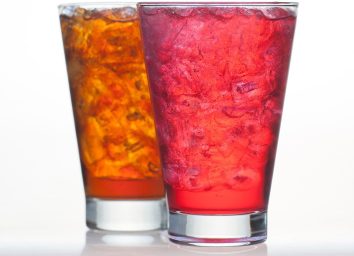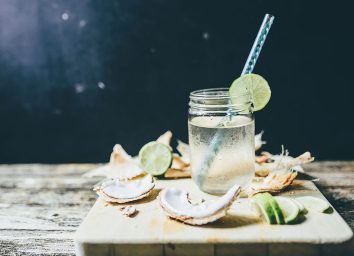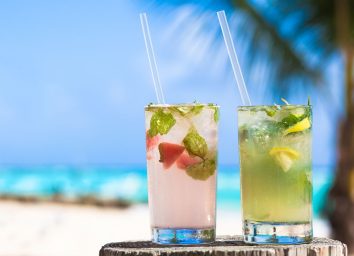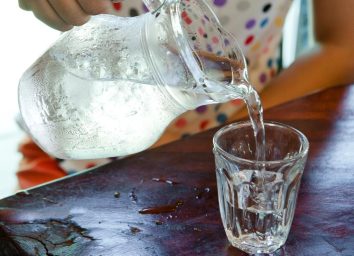Alkaline Water: Is It a Genuine Health Miracle or a Complete Hoax?
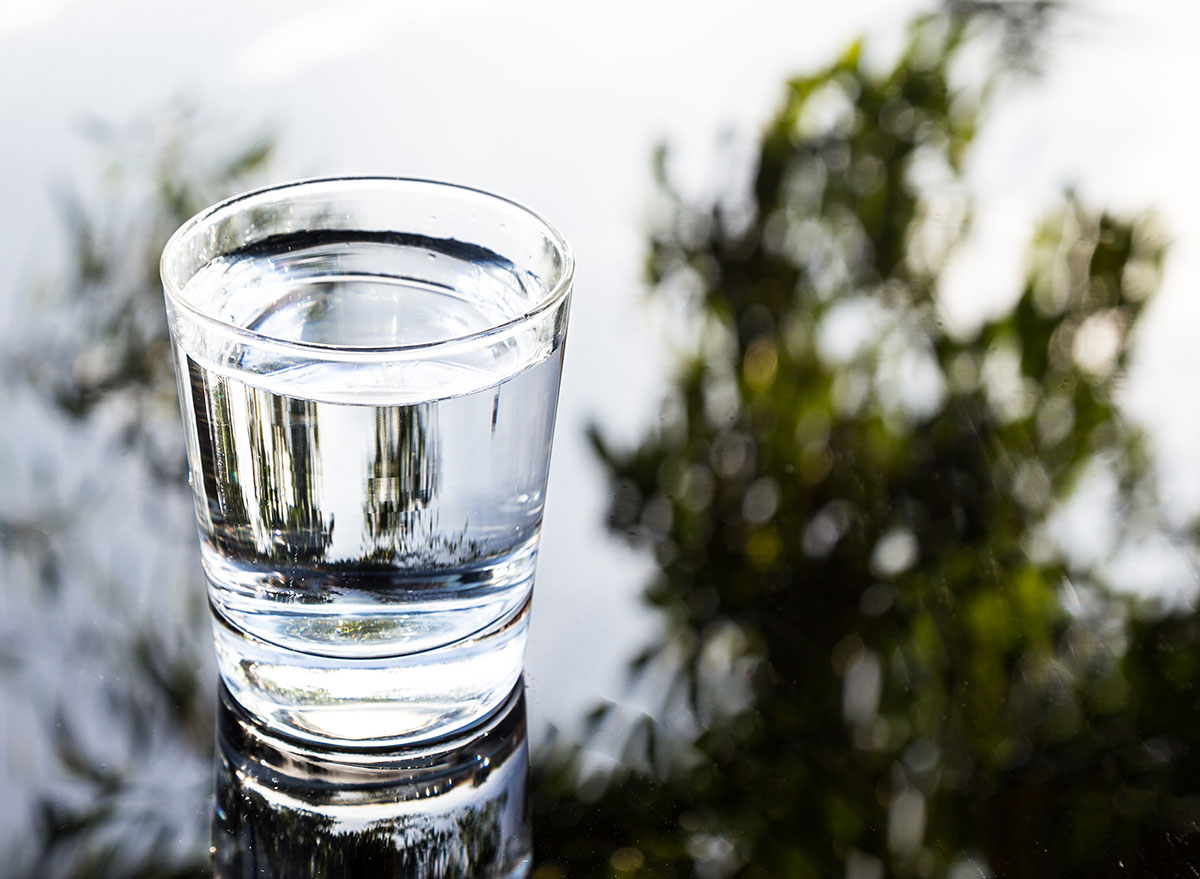
Nearly every piece of health advice out there, whether it's from a doctor or a nutritionist or your next-door neighbor, usually has something to do with "drinking more water." Of course, we know water is healthy for us. Water helps with nearly every bodily function—such as regulating the kidneys, avoiding constipation, and so much more. Drinking ample water is attributed to clearer skin, wrinkle prevention, and aiding in weight loss. After all, people are 60 percent water. But what if you're not drinking the "right" water?
With companies like Smart Water and Essentia focusing their bottled water products more heavily on pH and marketing them as alkaline, you may be wondering: What's with the alkaline water hype, and is it really worth it?
Here, we get to the bottom of alkaline water and if it's something you need in your fridge—or if you're better off without it.
What does alkaline mean?
Let's start here with a simple explanation of the pH scale. Basically, the pH scale ranges from 1 to 14, 1 being acidic, 14 being alkaline, and 7 being neutral.
Remberto De Leon, Manager of Rica Water in Englewood, New Jersey, helps us break it down.
"Ideally, you would want your body's pH level to sit at about a level 7, which is considered neutral," De Leon says.
Your lungs and kidneys work to maintain your pH level, which is also referred to as acid-base balance. The lungs release carbon dioxide, which is a mildly acidic waste product. By simply breathing, you are getting rid of some of the carbon dioxide in your body, which reduces acidity.
The kidneys work in tandem with your lungs, excreting acids or bases into the blood. The average human's pH level should be about 7.40. Blood pH imbalances can cause one of two conditions: acidosis, which is blood with a pH of less than 7.35 (too acidic), or alkalosis, which is blood with a pH higher than 7.45 (too basic).
"Most people have an acidic diet that tends to lower their pH level," De Leon says. "Drinking alkaline water and eating an alkaline diet can help bring that [pH] back into equilibrium."
What exactly is alkaline water?
Now that we've established that alkaline is any pH from about 8 to 14, let's talk about where water comes into play. Just how our blood has a pH level, water and food also have pH levels, too. Therefore, water and food can either be acidic, neutral, or alkaline.
Alkaline water is typically categorized by any water that has a pH of 8 or higher. However, pH isn't the sole determinant of whether water is alkaline; the water must also contain alkaline minerals and negative oxidation-reduction potential. Oxidation-reduction potential (or ORP) is how capable water acts as an antioxidant. In this case, the more negative the ORP, the more effective water works as an antioxidizing agent.
What are the benefits of drinking alkaline water?
While there are many who believe there are meaningful health benefits to drinking exclusively alkaline water, it's important to keep in mind that there isn't a ton of scientific evidence to support that alkaline water is a better drinking water alternative than your basic H2O.
Pro-alkaline water advocates maintain that alkaline water has anti-aging properties, helps regulate the colon, supports the immune system, offers better hydration, can aid in weight loss, and even fight off cancer.
Again, more research is needed on the subject, though there have been studies that surmise alkaline water can help clear skin conditions such as acne and eczema, mitigate symptoms of conditions such as high blood pressure, high cholesterol, and diabetes, and even deactivate the enzyme that causes acid reflux.
What are the risks of drinking alkaline water?
Generally, drinking alkaline water is considered safe. However, because there is not much research on the effects of alkaline water, there is always a chance you may experience negative side effects.
Such side effects could include alkalosis, a condition that occurs when your blood's pH ranks higher than a 7.4 (too basic). The symptoms of alkalosis include nausea, vomiting, hand tremors, muscle twitches, confusion, and tingling in the extremities and/or face.
How does alkaline water compare with plain water?
It's important to note that everything we eat and drink has a pH, so if our blood pH level scales on the acidic side, drinking alkaline water can help balance out the pH level.
Alkaline water is said to lubricate joints, keeps your eyes, mouth, and nose more moist, deliver oxygen throughout the body, hydrate the skin and internal organs, regulate body temperature, flush out bowels, maintain blood pressure, and even prevent kidney damage.
But wait—plain water does this too, right? Yes, it does.
See, the body likes its pH to be neutral. This is partly because it flushes out anything on the acidic side. Alkaline water is said to be more easily absorbed by the body's cells and organs because it is more hydrating and contains more nutrients than plain water, but again, more research needs to be done before determining if alkaline water is actually better than the stuff that comes from your tap.
Is it worth adding alkaline water to your daily diet?
The choice is really up to you. Drinking more water—regardless of type—is never a bad thing!
Whether you want to drink alkaline water or not is a personal preference, as there isn't a ton of proof out there that alkaline water will vastly improve your overall health as opposed to regular H2O. Drinking plain water is fine because if your body systems are functioning properly, your blood pH will remain steady. Your body knows how to regulate acidic and alkaline foods and drinks already—it doesn't need specialized water to help out.
Plus, you can still reap the supposed benefits of alkaline water through foods instead.
"There are so many great [alkaline foods] to choose from," says De Leon. "Some examples are kale, bananas, and watermelon." These are healthy foods you'd want to eat more of anyway, regardless of how alkaline they are.
As De Leon points out, it all comes down to "eating right and exercising" in order to feel your best, and drinking more water, whether it's plain or alkaline, is a great addition to a healthier lifestyle.
Where can I get alkaline water?
If you're thinking about trying out alkaline water to see how you feel as compared to when you drink plain water, it's fairly easy for you to do. It's available in a lot of stores, including your local supermarket. Places such as Whole Foods and Stop N' Shop carry bottled alkaline water brands like Smart Water and Essentia.
Bottom line: Is alkaline water really going to change your life?
While there are plenty of advocates out there, don't expect drinking alkaline water to be like waving a magical wand. Research is scant on its actual benefits, but there's no doubt that drinking more water in general is a good thing. It's ultimately your choice which type of water to sip on, but going with plain H2O is always a better option than drinking soda or other sugary beverages, so you're taking a step in the right direction by drinking more water.
